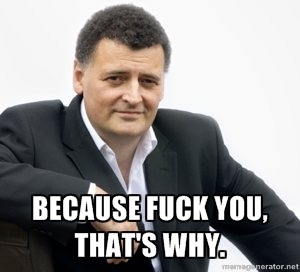Some emotional stuff, absolutely, but almost unearned.
Moffat in a nutshell, really. He tries, but he's far better at the intellectual stuff and never seems able to pull off the emotional side. The show has continued in the style of Davies', but Davies was somehow very good at invoking feelings and Moffat is not.
Still, I enjoyed it overall, despite it playing a bit like "Moffat's Greatest Hits." The business with novel was a regurgitation of the DVD business from "Blink," River and the Doctor communicating across time via written material was from "Time of Angels" and so forth. But the Angels were interesting again, which was sorely lacking in their prior appearance. So that was a plus. And Rory deciding on suicide as the way to cause a time paradox was very effective. Too, I really liked how the ending tied things all the way back to that unexplained TARDIS sound effect in "The Eleventh Hour."
So, it was fun, albeit not perfect.


 )
)